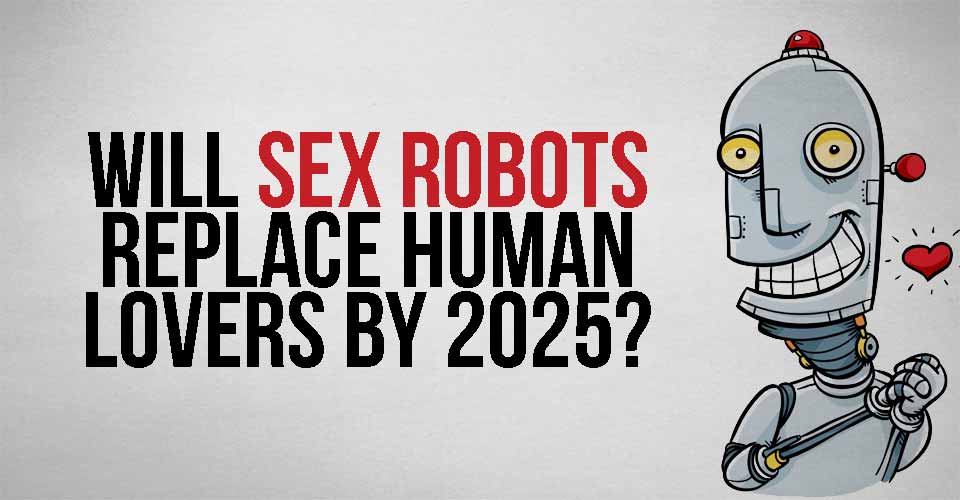
Could it be the end of old fashioned love, romance and sex as we know it, as sex with humanoid robots is reported to become common practice by 2025, perhaps even overtaking sexual activity between humans?
Reports say that by 2030 virtual sex will become as casual as browsing porn websites and by 2035 many will have toys that interact with virtual reality. In fact, high-income groups could begin to use some forms of robot sex as early as 2025, before the practice overtakes sex between humans fully by 2050.
At least it might be an effective way of controlling overpopulation and sexually contracted diseases, but somehow I can’t see how the robotic experience, other than being novel and suitable for the most addictive personalities, can replace the intimacy of the human touch and the passion found in deep emotional connection.
However futurologist Dr Ian Pearson has now predicted that the specialised robots will start to appear in ordinary homes in the next decade, as randy humans look for hassle-free love. ‘Initially, people will find it difficult to adjust to this new sex activity but will eventually become used to it, just as they embraced porn’, says Pearson. ‘When the look and feel of robots improve, people’s opinion will also change.’
He goes on to say: “Some people will enthusiastically embrace relationship-free robot sex as soon as they can afford one — as early as 2025. Brothels and strip clubs will soon include robots and they will be a specific fetish for some people, as well as a potentially cheaper replacement for real-life interaction.”
The rise of sex robots has featured in TV and cinema dramas recently, with films like British made Ex Machina focusing on the emotional impact of human-robot relationships.
Dr Pearson explains : “A lot of people will still have reservations about sex with robots at first but gradually as they get used to them, as the AI and mechanical behaviour and their feel improves, and they start to become friends with strong emotional bonds, that squeamishness will gradually evaporate.”
While Dr Pearson’s vision may seem far-fetched, Neal Slateford, co-owner of Britain’s biggest online sex toy retailer, Lovehoney, predicts that robot sex will be commonplace far sooner.
He says: “The early robotic toys are out of the price range of most people, costing around £6,000, but the technology is developing all the time.”
In response, researchers Kathleen Richardson and Erik Billing have launched the Campaign Against Sex Robots, an effort to draw attention to what they see as the potential societal harm of human-like robots created for the purpose of having sex with humans. While these products are not yet widely available, they “seem to be a growing focus in the robotics industry,” Richardson, an ethics of robotics research fellow at England’s De Montfort University has stated.
Billing, a lecturer at the University of Skovde in Sweden, explains that he and Richardson “did not launch this campaign to protect the rights of the robots.” Instead, he explained, they are concerned that using sex robots could foster unhealthy attitudes towards sex and gender relations.
“The danger of sex robots lies in what we read into them, how we form fantasies that, in some respects, become a reality — a reality where the human (male) user is expected to turn on his woman robot companion for his own, lone, pleasure,” Billing said. “I think most of us would agree that this is very far from a healthy, mutual, sexual relationship.”
However futurist website Transhumanity argues that robot lovers could help extend life spans by giving users mind-blowing “longevity orgasms” far superior in quality to those from human “meat-bag” partners.
It’s long been claimed that orgasms have significant health benefits, and “The Longevity Project,” a book about an eight-decade study of long-life factors, observed that women with higher frequency of orgasm during sex lived longer.
Transhumanity elaborates: “[Sexbots will] be more desirable, patient, eager, and altruistic than their meat-bag competition, plus they’ll be uploaded with supreme sex-skills from millennia of erotic manuals, archives and academic experiments, and their anatomy will feature sexplosive devices…“
So assuming robots can do it better than humans, is there necessarily a correlation between the quality of orgasm and longevity? Or is frequency of climax the most important factor? If the latter is the case, then a sex robot’s superior skills in the sack might be less of a game changer than the fact that a sexbot will never be too tired or unwilling to get it on.
Are Sexbots weird? Will humans be pathetic if we don’t just mate with each other? According to studies, we’re already mostly “solo” when it comes to orgasms. “Masturbation,” noted Hungarian psychiatrist Thomas Szasz, “is the primary sexual activity… in the 19th century it was a disease, in the 20th it’s a cure.”
I think most of us generally prefer sex with live partners, but as hplusmagazine observes rather humorously: ‘if the desired one is often unavailable or inadequate. Sexbots will never have headaches, fatigue, impotence, premature ejaculation, pubic lice, disinterest, menstrual blood, jock strap itch, yeast infections, genital warts, AIDS/HIV, herpes, silly expectations, or inhibiting phobias. Sexbots will never stalk us, rape us, diss us on their blog, weep when we dump them, or tell their friends we were boring in bed. Sexbots will always climax when we climax if we press that little button on their butt.’
Well I guess we’ll have to wait and see how it all plays out and put that computer generated life prolonging orgasm on hold for a decade or so whilst we focus on our fleshier counterparts, I’m in no hurry.
What do you think about this article? Does it make you uncomfortable or are you going to start a sexy savings account straight away? Share your thoughts below.

